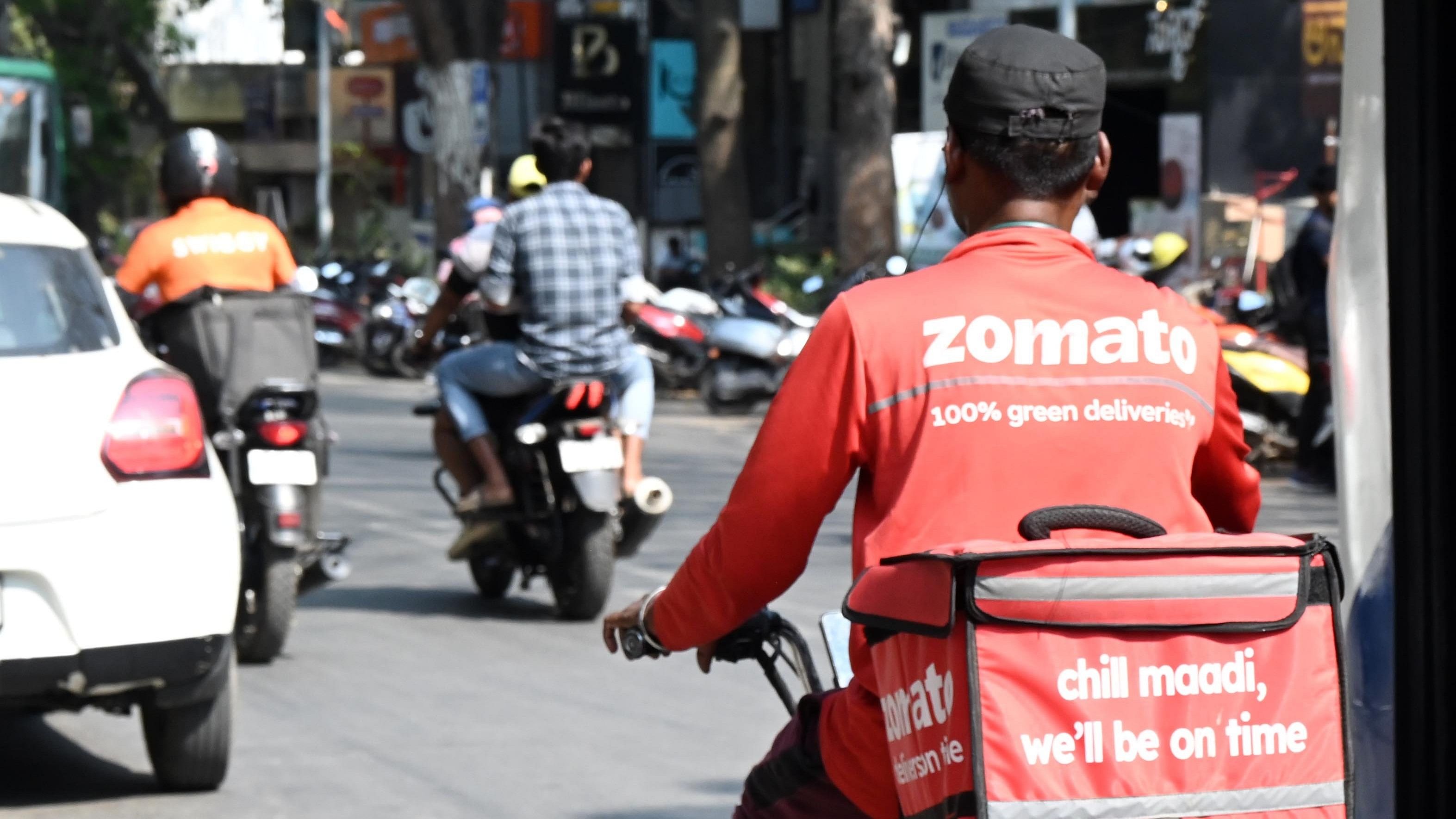
Delivery boys in different companies at RMV 2nd stage.
Credit: DH Photo/BK Janardhan
According to a new survey, delivery agents and cab drivers are overworked and underpaid, experience violence at work, and suffer from anxiety and pain, it says.
Conducted by People’s Association in Grassroots Action and Movements and the Indian Federation of App-based Transport Workers, the survey spoke to 10,000 respondents across eight Indian cities, including Bengaluru.
‘Fix minimum wage’
Raghunandan M delivers groceries. He is on the road for 11 hours a day and logs off once a week. He says, “It’s a full-time job, not a gig. I only make Rs 20,000 a month. I can neither spend time with my family nor earn well for them.” He adds, “The government should set a minimum wage. While I get insurance, having ESI and PF benefits will also be helpful.”
Others also voiced the need for guaranteed earnings. They say weekdays are often lean, payouts keep changing, riding in the heat and rain takes a toll on health, and a spiralling number of delivery agents and inscrutable algorithms shrink the orders coming their way.
Tanveer Pasha, president, Ola Uber Driver’s and Owner’s Association, agrees. He says, “Cab drivers were making Rs 2,000-Rs 3,000 a day, after deductions, in 2016. Now, they take home Rs 500-Rs 1,000.”
‘Reimburse fuel costs’
Sanju (name changed) says despite working like a “racehorse”, sometimes 97 hours a week, he can’t save beyond Rs 5,000 a month. “Until last year, my company used to cover the costs of travelling for picking up and dropping orders. Now, it doesn’t pay for pick-up and pays Rs 20-30 less for drop,” he claims. Incentives come with rigid conditions which are difficult to meet. They are often given for night duty or during festivals. The least the companies can do is reimburse the fuel and bike repair costs, he says.
‘Need resting spaces’
“Companies should provide resting spots for us in gated communities and public places. The heat is too much already,” says Pratap, a delivery agent with a grocery app. Last year, Zomato opened a rest point at a Bengaluru mall as part of its initiative to build shelters.
Pratap rides an e-bike on rent and would like the app aggregator to foot the bill. “I spend about Rs 300 towards the bike rental daily,” he says.
‘Hear us out fast’
Sanju says gig jobs are unsafe at night. Workers are robbed of mobile phones, power banks and earphones. “Once, a group of boys pulled out a knife on me over a refund,” he recalls.
A delivery agent says customer care executives take “15-20 minutes” to address a dispute and such delays impact overall earnings. He would like swifter and impartial resolutions. Often, they side with customers and de-platform gig workers for months, many claim.
What’s in the report?
According to the report, titled ‘Prisoners on Wheels?’
* 80% cab drivers and 73% delivery personnel are unhappy with their earnings.
* 31% cab drivers and 78% delivery persons work more than 10 hours a day but earn just Rs Rs 10,000 to Rs 15,000 a month.
* 60% of drivers from SC and ST communities work for 14-plus hours as opposed to 16% of drivers from other categories.
* Over a third of cab drivers reported deductions of 31-40% per ride and 68% delivery personnel faced ‘arbitrary’ deductions.
* 47.1% cab drivers and over 41% of delivery personnel experienced violence at work.
* 80% of both groups were impacted by ‘ID blocking’.
Industry observers speak
Fairwork India has released five annual reports on the conditions of gig workers on digital labour platforms since 2019. Prof Balaji Parthasarathy of IIIT Bangalore is the principal investigator. He says the gig economy has changed to the extent that some platforms have better grievance redressal mechanisms and they issue contracts in regional languages. State governments in Rajasthan and Karnataka have also rolled out insurance schemes.
However, the needle hasn’t moved when it comes to minimum wages and the power to negotiate. He says, “Many issues are of collective interest and gig workers are denied the power to form collectives. They only get to speak as individuals to a call centre.”
He says the Code on Social Security was passed in 2020. “Neither is it implemented nor are the other three labour codes that address wages, working conditions, and collective bargaining for gig workers. Without regulation, platforms go scot-free.”
Tanveer Pasha of the Cab Drivers Union says Karnataka fixed uniform fares for all cabs in Bengaluru last month. “The apps have not implemented the fare structure but who’s checking?” he asks.
Employee status for gig workers is a key ask of unions. Vinay Sarathy, president, United Food Delivery Partner’s Union, says, “The US and EU countries are rethinking labour laws because they see that gig work is a new form of employment. Gig workers work by the rules of the company and also for a majority of food delivery partners, it is a full-time job.”
Sarathy welcomes Karnataka government’s initiative to provide Rs 2 lakh life insurance and accidental insurance of Rs. 2 lakh to gig workers but says they also need ESI and PF benefits. “They are time-tested social security schemes for families. The delivery job is risky,” he explains.